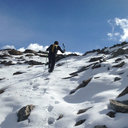Short-term intermittent hypoxia reduces the severity of acute mountain sickness.
Parole chiave
Astratto
Intermittent hypoxia (IH) is a promising approach to induce acclimatization and hence lower the risk of developing acute mountain sickness (AMS). We hypothesized that a short-term IH protocol in normobaric hypoxia (7 × 1 h to 4500 m) effectively increases the hypoxic ventilatory response (HVR) and reduces the incidence and severity of AMS. Therefore, 26 men (25.5 ± 4.4 years), assigned in a double-blinded fashion to the hypoxia group (HG) or placebo group (PG), spent 8 h at 5300 m before (PRE) and 2 days after cessation of the IH protocol (POST). Measurements included the evaluation of the Lake Louise Score (LLS) and the HVR. The severity of AMS decreased from PRE to POST in the HG (from 6.0 ± 2.7 at PRE to 4.1 ± 2.1 at POST), whereas the LLS in the PG stayed high (from 5.7 ± 2.9 to 5.5 ± 2.8, respectively). The HVR in the HG increased from 0.73 ± 0.4 L/min/% at PRE to 1.10 ± 0.5 L/min/% at POST and did not increase in the PG. The reduction of the LLS was inversely related to the changes in the HVR (r = -0.434), but the AMS incidence was not different between the HG and the PG at POST. In conclusion, short-term IH reduced the severity of AMS development during a subsequent 8-h exposure to normobaric hypoxia.



